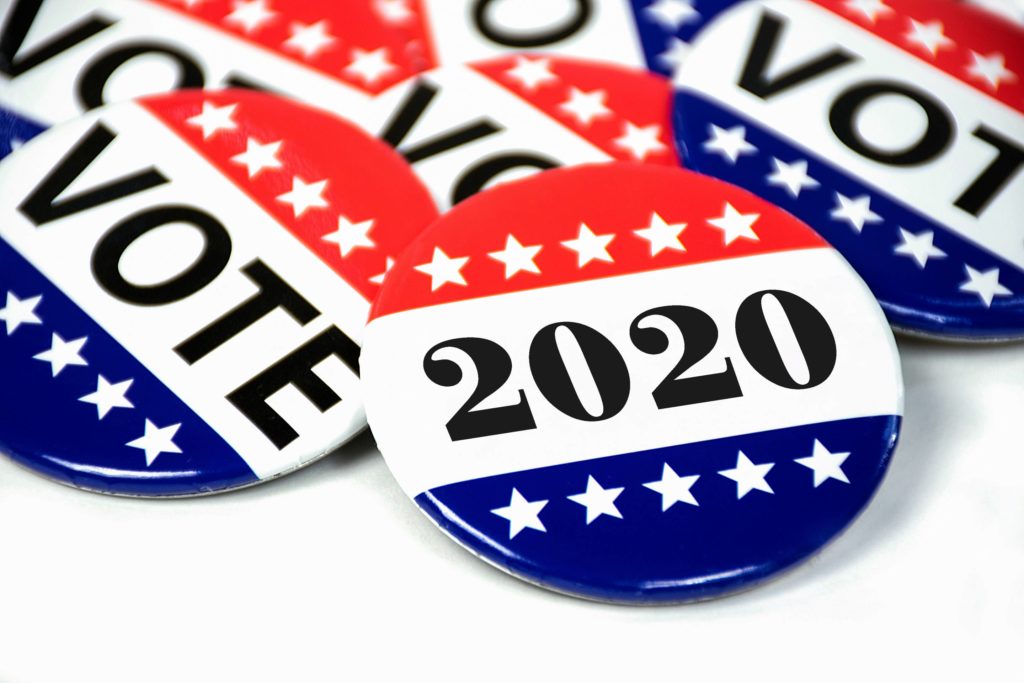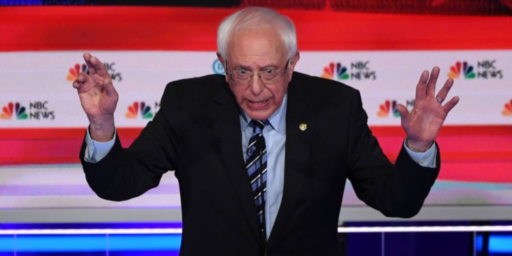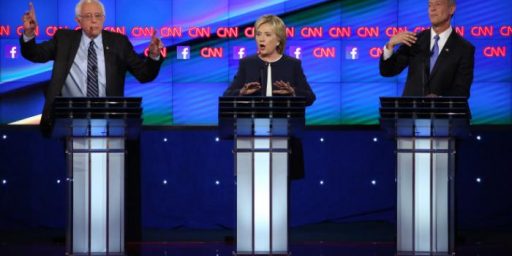What does “Electable” Mean?
Democrats say they want an candidate who is electable.

It has been part of the convention wisdom that Democrats are especially driven this campaign season to choose an “electable” candidate.
For example:
By a wide margin, 58 percent to 38 percent, Democrats say they would rather nominate a candidate who can defeat Trump than one who agrees with them on major issues.
Source: WaPo, “Sanders surges into national lead in new Post-ABC poll”
But, of course, most people want to elect someone who can win and, almost certainly, therefore, they think that the candidate they like is, in fact, the most “electable.”
To wit: 32% of Democrats currently support Sanders, and in the same survey, 30% think is the most electable (see the correlation of other candidates over time as well). As such, despite all the pundit-talk about the power of “electability,” I am not sure it really means what most pundits think it means.








I am very surprised. I thought Sanders was at his ceiling, and that he couldn’t really pick up any of the Biden disaffected. I appear to be wrong.
At the same time, the results in both IA and NH were so different from the polls that I might want to wait and see.
Just last night I encountered a commenter at another forum who said their favorite candidate was Warren, but since beating Trump was the most important thing in the world, they were going with one of the moderates.
Perhaps that’s what’s behind John Mellencamp’s recent endorsement of Bloomberg (which still floors me).
In general, though, I think you are right: People tend to believe that the candidates they like the most are also the most electable. The Sanders people have their own theory about why he’d be the strongest candidate against Trump. Still, from what I’ve seen it is the centrists who are likeliest to try to use electability as their central message. We saw that a few months ago when Jill Biden said basically that even if you don’t agree with Joe on everything, even if you find some of the other candidates more appealing, you gotta go with Joe because he’s the one who can beat Trump. I have not heard the Sanders people make an equivalent argument; they just tend to argue he’s the best in both policy and politics. They don’t frame it in terms of sacrificing an ideal.
@Kylopod: I am sure it influences some decisions. Speaking for myself, if the choices were X and Y and I really prefered X but the evidence told me that Y was more likely to beat Trump, I would vote for Y in the primary.
But, ultimately, I think for most people the two are largely the same (i.e., it just so happens that my guy/gal is the most electable!).
a simple definition pretty much reduces itself to tautology: an electable candidate is one whom a majority of people are willing to vote for; ie one who can get elected.
IMO, if the definition of a term isn’t useful, then likely the term itself is not useful.
@Steven L. Taylor:
The problem is that there’s no objective way of determining which candidates are more electable, and our opinions on the matter are bound to be colored to some extent by our ideological preferences.
Um…who thought Trump was electable? Not even Trump thought Trump was electable.
What does “electable” mean? Nothing. Pronouncing one candidate or another “unelectable” or “electable” is the way some self-anointed pundits protect their phoney baloney jobs.
If it were anyone but Sanders I would say that once they become the nominee that would gain on Trump because of Trumps negatives but Sanders hasn’t really been exposed. Socialism will play really in rural WI, PA, and MI. As will his positive comments about Castro and the old Soviet Union. And he won’t release all his medical records? He will lose to Trump, possibly bad enough to lose the house. If he is the nominee and loses mark me as an ex-Democrat.
And what if I believe that the best candidate is the one with the strongest plan for addressing the climate crisis? Well, I guess that I weigh up the choices and make my pick. But wait: the guy I like just happens to align with my primary criterion. Ouch! You got me! I guess I’m no better than voters choosing based on electability… What’s the argument again?
While electability will always be one factor in choosing a candidate, how often is it the factor? Maybe it’s the economy, stupid. Or a referendum on a war. This go round, many D’s want Trump out first and foremost. If I supported Biden because I felt he was a winner, then doesn’t it make sense that I jump ship after Iowa?
A black guy with an African/Middle Eastern dictator/terrorist-sounding name got elected over a charismatic white war hero and a catalogue-model-looking white successful businessman. Electability don’t mean much.
If Sanders gets the nomination, the attacks on him as a socialist might be successful, but probably mostly with people who already watch Fox News all day and wouldn’t vote for a Democrat anyway. Maybe they would be more successful and he would lose. If that happens, it’ll be infuriating because of the fact that Sanders isn’t actually a socialist.
@Teve:
The perhaps he shouldn’t say some of the things he himself has said.
In a speech he gave at the National Committee for Independent Political Action in New York City on June 22, 1989, reprinted in the December 1989 issue of the socialist publication Monthly Review: “In Vermont, everybody knows that I am a socialist and that many people in our movement, not all, are socialists. And as often as not — and this is an interesting point that is the honest-to-God truth — what people will say is, ‘I don’t really know what socialism is, but if you’re not a Democrat or a Republican, you’re OK with me.’ That’s true. And I think there has been too much of a reluctance on the part of progressives and radicals to use the word ‘socialism.’”
The ads will write themselves.
@Kylopod:
To a degree, that is exactly the point, of course.
But, one can reasonably choose to not vote Yang, for example, on electability grounds from an at least semi-objective POV.
I suspect the mistake made by many people, and specifically commenters here, when discussing Sanders is defining ideology too rigidly–particularly a self-defined moderate.
I think a decent case can be made that there are plenty of people in key states that would vote for Sanders before any of the other Democratic hopefuls. He’s explicitly pro-union. He speaks directly to the economic anxieties of rural whites, some unambiguously racist, others resentful of the perceived coddling of minorities, in a way that the other candidates don’t.
What some people see as negatives–his self-labeling, his stubbornness, his crankiness–may actually be assets from the perspective of some people who traditionally vote Republican. He’s unaplogetic about what he thinks, he is consistent in those beliefs, and he is passionate about them.
I bristle when people take the route of comparing Sanders to Trump, because people take it too far. The former has a sophisticated view, the latter is an empty-headed lout. But their style is similar, so it isn’t totally off-base.
Most of us, probably justifiably, scratch our heads at how a poor person could trust Trump to speak for them. But I suspect that it wasn’t so much that they trusted him, but that he seemed authentic when he spoke and that he made a point of speaking directly to them.
That was a quality that almost nobody saw in Clinton–even those, like me, who supported her. I admire her for a lot of reasons, and the Republicans have not run a candidate I would vote for over her for as long as I have been alive. But let’s not kid ourselves, she lacks the ability to connect with people. Sanders does connect with people.
The arguments against him largely turn on ideological and policy grounds. But that’s not what wins and loses elections for President. The problem with most of us here is that we intellectualize politics. There’s nothing wrong with that. But it becomes myopic once it is extended to others. Most regular ass voters, especially those in the working class, don’t approach politics that way.
@EddieInCA:
This again. The ads are already written. It’s not the s-word that writes them; it’s the d-word. Obama was called a socialist. There are people who think the whole democratic party is a bunch of socialists.
Give it a rest, they won’t vote for any of the other candidates either.
@Dave Schuler:
Yeah, but that bullshit is adopted by the non-professionals.
I posted a relevant comment on another thread today. But to put a slightly different spin on it, I’ll go this way:
How many NFL fans regurgitate the run the football nonsense in the first quarter? Hand it to Zeke! The Cowboys are 24-2 when he gets 100 yards! Establish the run!
Of course, the reason why the winning percentage is so high isn’t because the run gets established early, but because the team runs the ball late while holding a lead. More specifically, a good passing game early allows a running game to succeed late.
But passing is, according to conventional wisdom, riskier–three things can happen when you pass, and two of them are bad. People get fooled by supposed wisdom and for those people risk outweighs reward.
In fact, trying to establish the run early is exactly the wrong thing to do for most teams. Because if it fails and they get behind, the other team now controls the game. Then, the passing game becomes less effective as the threat of the run disappears.
Excluding a candidate based on perceived electability is like repeatedly running into the line for three yards in the first quarter. This is what Dems have done for thirty years–chosen candidates based on avoiding the risk of exciting the opposition. It has ceded control of the game to the GOP.
To the Dems:
Here we are again, let’s pass in the first quarter. The last time we did it–2008–we won. I recall quite a few people during the primary claiming Obama wasn’t electable. By the beginning of the fourth quarter of the general, the GOP was running ads that said, “Obama is not ready… Yet.”
Several of us agree that the electability concept is elusive and hard, if not impossible, to prove one way or the other. But there’s another, often overlooked problem, which is that it makes elections sound like a strictly binary affair. The electability doctrine typically asserts that certain types of candidates are guaranteed to lose. Let me save you the trouble. Such a candidate simply does not exist. There is literally no such thing as a candidate who “can’t win.” The belief that such candidates do exist is based on a fallacious understanding of how elections work. Any candidate who wins the nomination of one of the two major parties has at least a fighting chance of winning the general election, and in today’s time probably has a floor of roughly 45% of the popular vote and maybe around 15-20 states at minimum.
It is quite a different thing to argue that certain qualities or traits are a net negative for candidates. I do, for example, believe that Obama’s being black was a net negative for him electorally. He’s still the only Democrat since FDR to win a majority of the popular vote twice.
One of the biggest dangers of the electability doctrine is that it makes people so over-cautious they end up gravitating toward candidates who are bland and unexciting–which is a real problem when it comes to inspiring turnout.
He won, among other reasons, because people were looking for someone different…one of the reasons why Trump also won…I wonder what kind of “different” people will be looking for this year…
@Daryl and his brother Darryl:
Yeah. The reporting is pretty well aligned on that point.
“Electability” is basically just how much a candidate resembles previous candidates who were elected. It’s just little-c conservative conventional wisdom mixed with fear.
A black man was “unelectable“ until he won.
A woman is “unelectable” because Hillary lost four years ago.
A liberal is “unelectable“ because McGovern lost about a billion years ago.
It’s dumb and it’s stupid. If “electability” mattered, Hickenlooper and Biden would be fighting it out for the primary to run against Romney, or Clinton would have won four years ago…
@Kurtz:
Obama had a record that showed he was not a socialist. Bernie, himself, has used the word socialist to describe himself. Repeatedly. If you think this won’t matter, then more power to you. But it will matter to a whole host of people.
Its a whole different circumstance when you call someone a socialist with no evidence behind it it, and call someone else a socialist who themselves have used the moniker to describe themselves.
@EddieInCA:
That mattered absolutely zero. My family and old friends who lived in Obama’s state or next to it still called Obama the worst socialist communist American hating anti-colonialist EVER!!!! For fck’s sake they saw Obama’s in action up close and still gobbled the talking points up. Because what matters is that D or R next to the name the rest is just whatever they are told to repeat. Then it was Hillary’s turn because she was the next D that needed defeated.
If they are going to fall for the OMG SOCIALIST and can’t be bothered to look into it deeper then they weren’t going to be voting Democratic anyway.
@Gustopher:
Which I find super funny because Nixon was to the left of the modern democratic party… Hell Nixon is to the left of most of the Democratic candidates. Who among the Dems supported UBI and are still in it?
@Daryl and his brother Darryl: Yeah the look on Trump’s face when he won screamed “OH SHIT WHAT NOW???” not “OMG I WON WOOOO”… That makes it clear he wasn’t expecting to win.
@Matt:
Indeed. I had a family member tell me that Obama was the most liberal president we ever had. Another just knew that taxes were about to go through the roof. Both watch a lot of FNC.